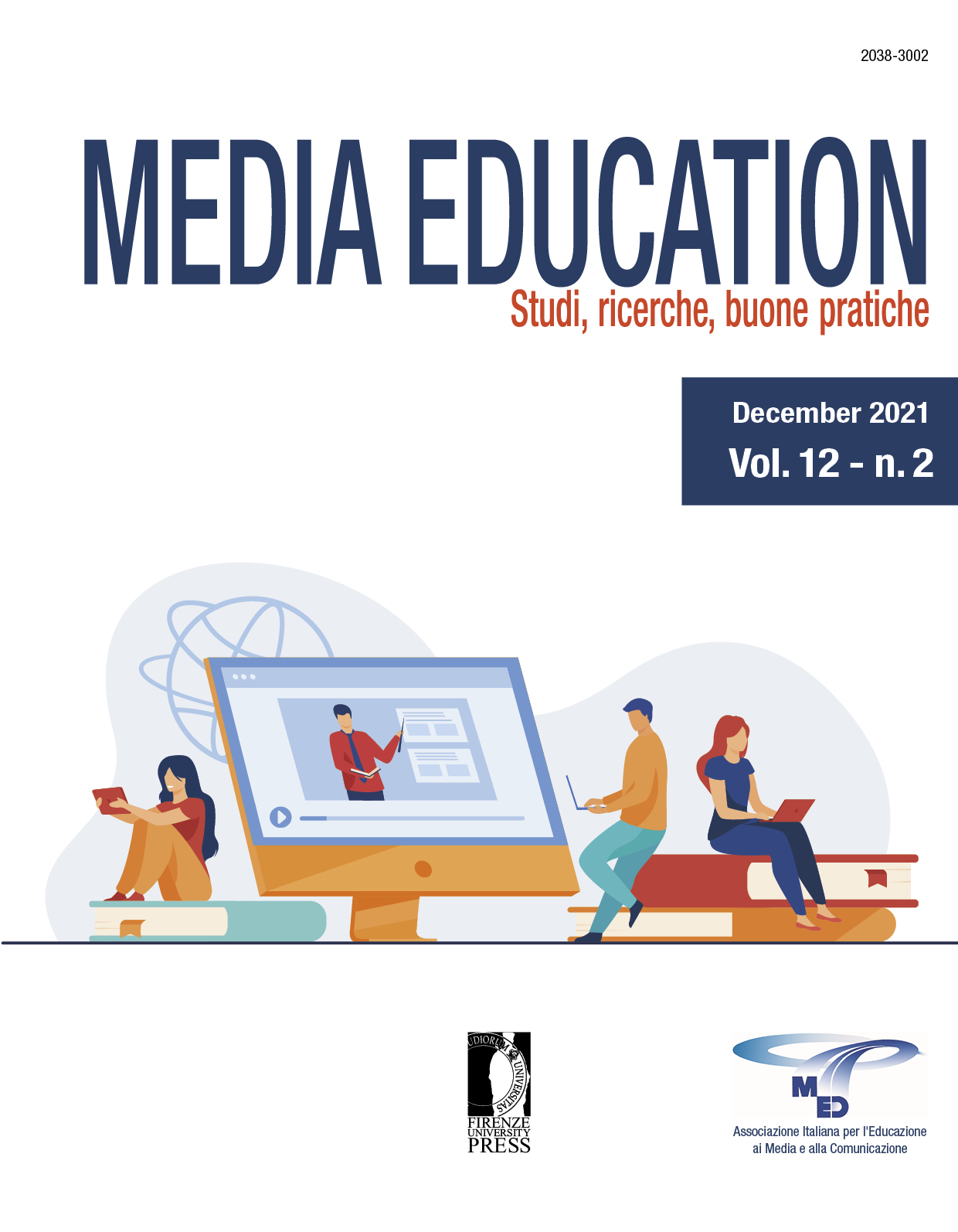Il coding nei percorsi di tirocinio degli studenti di Scienze dell’educazione e della formazione. Uno studio di caso
Published 2021-11-29
Keywords
- coding,
- creative learning,
- internship,
- professional development
Abstract
The rapid changes that characterize the world of work ask school and university to critically rethink the way to facilitate creative skills. The coding and the development of computational thinking are declined in this context as facilitators of these skills in everyday life and in working contexts. The contribution presents a case study that describes peer tutoring laboratory activities focused on learning coding skills that involved students, enrolled in the Degree Course in Education and Training Sciences of the University of Siena, as a form of alternative curricular internship during the lockdown period. The study shows how students approached this form of internship, how they designed peer tutoring sessions and the gains in terms of learning and professional development.
References
Butera, F. (2020). Le condizioni organizzative e professionali dello smart working dopo l’emergenza: progettare il lavoro ubiquo fatto di ruoli aperti e di professioni a larga banda. In Studi organizzativi n. 1/2020
Fabbri, L., & Giampaolo, M. (2019). Apprendimento trasformativo e tecnologie “in uso” come paradigmi di ricerca per l’innovazione delle organizzazioni complesse. In M.R. P. Federighi (a cura di), Digital Scholarship tra ricerca e didattica. Studi, ricerche, esperienze (pp. 53-65). Milano: Angeli.
Fabbri, L., Giampaolo, M., & Elisabetta, D.B. (2019). Quando la tecnologia sostiene le pratiche. La prospettiva del facilitatore tecnologico nella comunità "in buona salute". In A.G. F. Bruni (a cura di), Media Education in Italia. Oggetti e ambiti della formazione (pp. 297-306). Milano: Angeli.
Fabbri, L. (2017). Ricercatori ed insegnanti dentro setting di apprendimento trasformativo. In P.R. P.C. Rivoltella (a cura di), L'agire didattico. Manuale per l'insegnante (pp. 351-364). Brescia: ELS LA SCUOLA.
Fabbri, L., Melacarne, C., Giampaolo, M., & Romano, A. (2017). Methodology and approaches to support employability and organizational learning at University of Siena: the case of the Teaching and Learning Center. In Proceedings of the 2017 international Pre-Conference (pp.69-80). Atlanta, GA: American Association for Adult and Continuing Education.
Fabbri, L., & Melacarne, C. (2016). Didattica dell’innovazione e innovazione didattica. L’apprendimento come condizione per il cambiamento. In Coinvolgere per apprendere. Metodi e tecniche partecipative per la formazione (pp. 319-339). Pensa Multimedia
Fabbri, L. (2014). Università e nuove professionalità. METIS, 1(IV).
Fabbri, L. (2012). Le tecnologie "incarnate" nelle comunità professionali. Traiettorie di apprendimento trasformativo. In L'educazione tra reale e virtuale (pp. 101-109). Brescia: LA SCUOLA.
Fabbri, L., & Rossi, B. (2008). Cultura del lavoro e formazione universitaria. MILANO: Franco Angeli.
Fabbri, L. (2003). La costruzione dell'identità professionale. il contributo delle storie formative. In Il progettista di formazione individuale (pp. 18-36). AREZZO: UCODEP.
Lacasa, P. (2013). Learning in real and virtual worlds. Commercial video games as educational tools. Palgrave McMillan, Houndmills, UK
Lodi, M. (2018). Pensiero Computazionale: dalle “scuole di samba della computazione” ai CoderDojo. Atti del convegno DIDAMATICA 2018, Apr 2018, Cesena, Italy. Recuperato da: https://hal.inria.fr/hal-01913063/document
Prensky, M. (2001). Computer games and learning. University of California: Mc Graw Hill
Schmidt, J. P., Resnick, M., & Ito, J. (2016). Creative learning and the future of work. In D. Noedfords, V. Perf, and M. Senges (eds.). Disrupting unemployment, Ewing Marion Kaufman Foundation: Kansas City, 147-155. Retrieved from https://www.researchgate.net/profile/David_Nordfors/publication/301233086_Disrupting_Unemployment/links/570e9e8a08aee328dd6541a1/Disrupting-Unemployment.pdf#page=155
Robinson, K. (2010). Changing education paradigms. Retrieved from http://www.cfpscourseweb.com/pluginfile.php/1099/block_html/content/RSA%20%20Ken%20Robinson%20Lecture%20-%20transcript.pdf
Robinson, K., & Aronica, L. (2016). Creative schools: The grassroots revolution that's transforming education. Penguin books.
Resnick, M. (2007). All I Really Need to Know (About Creative Thinking) I Learned (by Studying How Children Learn) in Kindergarten. In Proceedings of the 6th ACM SIGCHI Conference on Creativity and Cognition. pp. 1–6. ACM, New York, NY, USA
Resnick, M. (2014). Give p’s a chance: Projects, peers, passion, play. In proceedings of Constructionism and Creativity Conference, Vienna, Austria
Resnick, M. (2018). Come i bambini: IMMAGINA, CREA, GIOCA e CONDIVIDI. Coltivare la creatività con il Lifelong Kindergarten del MIT. Edizioni Centro Studi Erickson.
Papert, S. (1980). Mindstorms: Children, Computers, and Powerful Ideas. Basic Books, Inc., New York, NY, USA
Papert, S. (1991). Situating Constructionism, in I. Harel and S. Papert, (Eds.). Constructionism, Ablex Publishing.
Piaget J. (1976). Piaget’s Theory. In: Inhelder B., Chipman H.H., Zwingmann C. (eds) Piaget and His School. Springer Study Edition. Springer, Berlin, Heidelberg. https://doi.org/10.1007/978-3-642-46323-5_2
Piaget, J. (2016). L'epistemologia genetica. Edizioni Studium.
Vygotskij L. S. (1997). The collected works of LS Vygotskij: Problems of the theory and history of psychology (Vol. 3). Springer Science & Business Media.
Wing, J.M. (2006). Computational thinking. Communications of the ACM, 49(3), 33-35.
Wing, J. (2017). Computational thinking’s Influence on Research and Education for all. International Journal of Educational Technology, 25(2).

